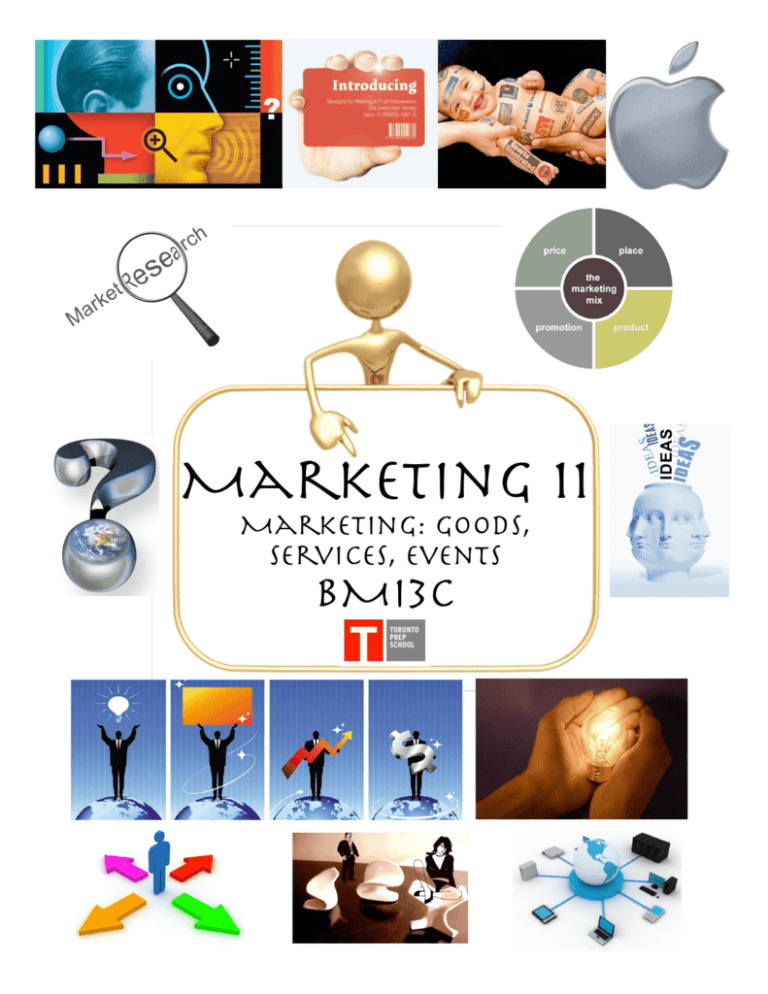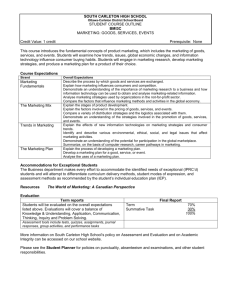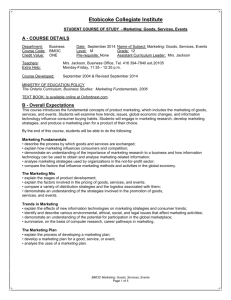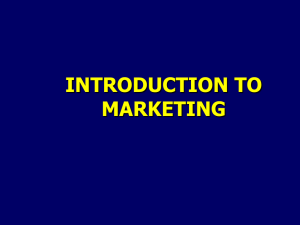BMI3C First Day Handout sem.2.Jan. 2015 copy
advertisement

MarketinG 11 Marketing: Goods, Services, events BMI3C TORONTO PREP SCHOOL COURSE: GRADE: CREDIT: PREREQUISITE: TEACHER: TEXT: EMAIL: WIKISITE: ABSTRACT: MARKETING: GOODS, SERVICES, EVENTS (BMI3C) 11 1.0 None TJ Eason Marketing, 8th Canadian Edition, Crane, Kerin, Hartley and Rudelius McGraw-Hill Ryerson, 2011 teason@torontoprepschool.com tpshome.wikispaces.com This course introduces the fundamental concepts of product marketing, which includes the marketing of goods, services, and events. Students will examine how trends, issues, global economic changes, and information technology influence consumer buying habits. Students will engage in marketing research, develop marketing strategies, and produce a marketing plan for a product of their choice. Marketing Fundamentals: Overall Expectations By the end of this course, students will: • describe the process by which goods and services are exchanged; • explain how marketing influences consumers and competition; • demonstrate an understanding of the importance of marketing research to a business and how information technology can be used to obtain and analyse marketing-related information; • analyse marketing strategies used by organizations in the not-for-profit sector; • compare the factors that influence marketing methods and activities in the global economy. The Marketing Mix: Overall Expectations By the end of this course, students will: • explain the stages of product development; • explain the factors involved in the pricing of goods, services, and events; • compare a variety of distribution strategies and the logistics associated with them; • demonstrate an understanding of the strategies involved in the promotion of goods, services, and events. Trends in Marketing: Overall Expectations By the end of this course, students will: • explain the effects of new information technologies on marketing strategies and consumer trends; • identify and describe various environmental, ethical, social, and legal issues that affect marketing activities; • demonstrate an understanding of the potential for participation in the global marketplace; • summarize, on the basis of computer research, career pathways in marketing. The Marketing Plan: Overall Expectations By the end of this course, students will: • explain the process of developing a marketing plan; • develop a marketing plan for a good, service, or event; • analyse the uses of a marketing plan. Unit Length 25 hours 20 hours 25 hours 20 hours Marketing Fundamentals Marketing Research Marketing Mix: Product and Price Marketing Mix: Place and Promotion The Marketing Plan 20 hours Total 110 hours Unit 1: Marketing Fundamentals Students will describe the process by which goods and services are exchanged: explain how marketing influences consumers and competition. Students will analyse marketing strategies used by organizations in the not-for-profit sector, and identify and describe various environmental, ethical, social, and legal issues that affect marketing activities. Unit 2: Marketing Research Students will explain the importance of marketing research to a business and how information technology can be used to obtain and analyse marketing related information. The students will identify and summarize career pathways in marketing using computer research. Unit 3: Marketing Mix: Product and Price Students will explain the stages of product development; explain the factors involved in pricing of goods, services, and events. The students will demonstrate an understanding of the potential for participation in the global marketplace. Unit 4: Marketing Mix: Place and Promotion The students will compare a variety of different distribution strategies and demonstrate an understanding of the strategies involved in the promotion of goods, services, and events. Students will explain the effects of new information technologies on marketing strategies and consumer trends. Unit 5: The Marketing Plan The students will explain the process of developing a marketing plan for a good, service, or event and be able to analyse the uses of the marketing plan. Assessment and Evaluation of Student Performance: Assessment is the process of gathering information from a variety of sources (including assignments, demonstrations, projects, performances, and tests) that accurately reflects how well a student is achieving the curriculum expectations in a subject. As part of assessment, teachers provide students with descriptive feedback that guides their efforts towards improvement. Evaluation refers to the process of judging the quality of student work on the basis of established criteria, and assigning a value to represent that quality. Assessment and evaluation will be based on the provincial curriculum expectations and the categories of knowledge and skills outlined on the Achievement Chart - Business Studies, Grades 9-12. A variety of strategies will be used to assess and evaluate student achievement. These strategies include oral communication, performance, and writing tasks such as tests, quizzes, assignments, projects, reports, presentations and computer applications. ACHIEVEMENT CATEGORY: Knowledge/Understanding Subject-specific content acquired in each course (knowledge), and the comprehension of its meaning and significance (understanding). 25% Thinking/Inquiry and Problem Solving: The use of critical and creative thinking skills and/or processes. 20% Communication The conveying of meaning through various oral, written, and visual forms, including electronic forms. 20% Application The use of knowledge and skills to make connections within and between various contexts. 35% Term Work 70% Course Cumulative Task (CCT) 30% Students will prepare and present a marketing plan to the class - 10% of CCT. Students will write a final exam based on the course material and the marketing plans - 20% of CCT. IMPORTANT DATES: Advertising Campaign Due Dates: - Product Selection Date - Logo, Slogan and Packaging - Print Media Advertisement - Radio Advertisement - TV Advertisement - Wednesday, February 4th, 2015 - Tuesday, February 24th, 2015 - Friday, April 3rd, 2015 - Tuesday, April 21st, 2015 - Tuesday, May 5th, 2015 Test Dates: - Test # 1 - Thursday, February 19th, 2015 - Test # 2 - Tuesday, April 7th, 2015 - Test # 3 - Thursday, April 30th, 2015 - Test # 4 - Friday May 23rd, 2015 * These dates provide a framework for the semester and are subject to change EXTRA HELP: Extra help will be available Monday to Friday 9:00 - 9:55 AM and after school by appointment. Help will also be available at the After School Homework Club and on most Saturday Club dates. Academic Due Date Policy All assignments and projects will have a due date. The due date is the beginning of the period for that given class. For example if a project is due for the period one class it must be submitted at 10:00 AM, if it is due for the period four class on a Wednesday, then it is due at 2:49 PM. The due date represents the date in which the assignment/project is due. Students should submit the assignment/project to their subject teacher on the due date. If a student does not submit the task on the due date the subject teacher will contact the parents/ guardian to notify them of the outstanding work that day. The subject teacher will not provide support after the due date has passed. Late marks will be deducted on late assignments. This strategy is in keeping with the Ministry’s policy document “Growing Success”. Late projects/assignments will be assessed at a reduction of 5% per day for the first two days and 10% per day after that to a maximum of 50%. Each project will be assessed for the 100% of its original value, and late marks will be clearly stated on the final evaluation. After 6 school days, a student will receive a zero. Students are strongly encouraged to still hand in late projects for assessment and written feedback. A Saturday Club inclusion will be made within the 6 days. Projects/assignments turned into the teacher after they have been marked and returned to students, will not be awarded a grade if the project/assignment is one the teacher believes can be copied from peers (at teacher’s discretion), however, written feedback on the assignment will be given. (For example: journals, reflection pieces, etc.) Extension Request Form There is a procedure for students to seek relief from a due date and extend a deadline without academic penalty. In extraordinary circumstances, extensions may be granted, if an Extension Request Form is filled out by the student and signed by a parent and approved by the teacher at least one day before the due date. It is up to the discretion of the teacher and the school administration whether or not to accept the Extension Request. A student may request an extension to the maximum of 2 times in each course and for no more than 3 days. After the allotted time has passed and the assignment has not been submitted then late marks will be assigned. Our policy recognizes that extenuating circumstances may legitimately prevent a student from meeting a due date. The Extension Request Form may be garnered from the principal or vice-principal. Illness/Doctor’s Notes If a student is absent on the due date, a doctor’s note (or parental note in case of a family emergency) must be provided to the subject teacher in order for the student to submit the assignment. The assignment must be submitted upon the first day the student returns. Parental Communication Parents will be contacted if the assignment/project is not submitted on the due date. Email receipt of Assignments Since weekend days will be included in the late policy, the submitted time and date will be based on the time that the assignment arrives in the teacher’s email in-box.







